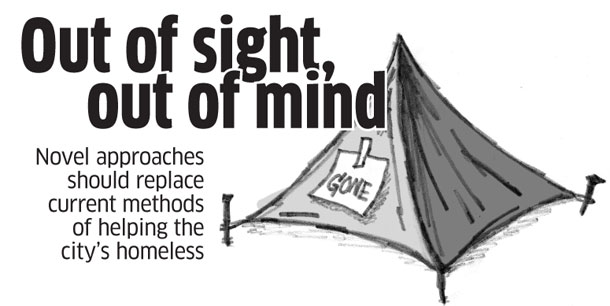Three weeks ago, Madison’s disgruntled homeless population propped up a tent village on East Washington Avenue, informally co-opting the Occupy movement. Police captains, and bureaucrats paraded in by day, and swarms of drunks stumbled in at night. They were under siege, the city has since evacuated them farther east.
Out of sight, out of mind – right? Not exactly, considering its been tried before. Previously, the collective institutions of Dane County brought down the hammer, breaking up a discrete site in a secluded park on the far north side. At this rate, Occupy will stop getting harassed once they’re pushed into Lake Mendota – or return to rugged individualism on the streets.
This most recent Occupy was more tempered than those of past years. All campers rigidly adhered to self-directed, good neighbor guidelines. There were daily council meetings. Visible alcohol and intoxication were banned. Security was in place, breaking up trouble.
Confused residents loudly expressed their sentiment at neighborhood association meetings. However, the general atmosphere has been one of guarded indifference. The NIMBY’s (“not-in-my-back-yard”) aren’t the ones giving them the boot.
A layered tandem of camping and zoning ordinances, neighbors, and heavy-handed precinct captains is a machination in itself. It works beyond the corner, a closed loop, dedicated to dismantling these kinds of things. Every year a camp springs up of the down and out, fed up in the face of a callous winter. Every year that system, that tandem, gets better at dispersing those misfortunate, giving them the boot. This machine labors to make the homeless in their image – invisible.
The plight of these particular homeless people is a symptom of our society’s conservatism. There is too much holding to the legal imperative. More pragmatic approaches are shunned, in favor of a system underhandedly acknowledged as having no expedient solution.
Only after Occupy camped out on the sprawling front lawns of the Dane County Department of Social Service (DSS) did they finally voice advocacies of support. If not for this shrewd political move, local authorities would have pecked the group apart. Instead, out of embarrassment, the DSS flung out empty promises of a solution via institutional means – more of the same rhetoric of ferreting the homeless into critically overcrowded shelters.
The DSS will provide shelter space for four of the thirty campers before winter’s end. This cutthroat bargain implies that 26 people must pitch out their tents to either jockey daily for a shelter bed, or to freeze in the WI streets.
As of now, they have been granted another temporary campsite – eight miles outside of the city limits. This deliberate placement, far away from crucial services (especially when the quickest mode of transportation available is a bicycle) is looking more like the Donner Party than a legitimate solution.
Innovative, inter-sectoral solutions are not only essential for this installation of Occupy, but also for future ills arising from institutional ineffectiveness.
Occupy is so purposefully broad that the collective dissatisfaction champions the name. To cast this only as Occupy is incomplete. The Occupy name carries a base of support and recognition. It serves to rally, to be a catalyst to action, and to define for the public the broad origin of your qualms. Though for all that to be, it takes one to recognize an inadequacy, and to effect a change. This spells courage.
It is expedient to take this for granted. This is a refutation of how it’s been, by those truly at the bottom, in a place most of us can only dread about. But even in this state, they have the time and energy to make a political statement – to protest. It’s a phenomenon that shouldn›t be hand-waved away because their summative demand is marginal services.
These are the economically disenfranchised, fed up with the status quo, facing a cold winter and the heavy hand of local institutions. They pitch their tents for the express purpose of not being exposed to the rife of filth, fleas, corruption and crime in the shelters, and even the churches.
These problems can›t be pushed to the edge of civilization in hopes they›ll go away. Until it›s properly managed, homelessness will continue to present itself at our doorsteps.


























